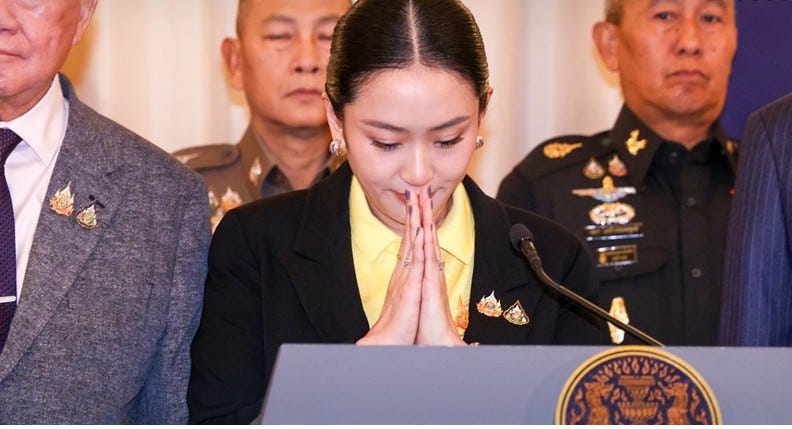Thai Government Near Collapse on Premier's Phone Gaffe
Coalition partner seizes pretext to bolt
Thailand’s coalition government appears on the verge of collapse, with Prime Minister Paetongtarn Shinawatra facing increasing demands to quit after former Cambodian leader Hun Sen apparently leaked a politically explosive phone call with her while she was trying to defuse a stubborn conflict over a relatively small chunk of border territory that both countries claim as their own.
The call, which pointed up the unwholesome connection between two powerful Asian clans, provoked widespread domestic anger and gave the conservative Bhumjaithai Party, a key coalition partner, the excuse to quit, with Paetongtarn referring to Hun Sen as "uncle" and criticizing the Thai Second Army commander as being on the "other side" of both the Thai and Cambodian governments. That antagonized the powerful military, which has dominated governments for nine decades, perpetrating nine unsuccessful coups and 13 successful ones. The most recent one was in 2014, which led to a decade of military misrule and corruption. Paetongtarn apologized publicly for the insult, with grim-faced generals behind her.
Bhumjaithai, the second largest in the alliance with 69 active members of parliament and which has grown increasingly disaffected with the coalition, used the controversy to pull out, saying the phone call had "damaged the sovereignty and well-being of the country and the Thai Army." Its departure leaves the government with only a few seats above the 248 needed for a parliamentary majority, and with smaller coalition members, including the Democrats and military parties ready to maneuver.
Anutin Charnvirakul, the Bhumjaithai leader, has been sparring for weeks with Thaksin Shinawatra, the prime minister’s father and political kingmaker, over his demand that Bhumjaithai give up the all-powerful Interior Ministry, which oversees local administrations, internal security, land management, issuance of national identity cards, and public works and provides a cornucopia of corruption-susceptible goodies. The ministry is also responsible for appointing Thailand’s 76 provincial governors, a huge source of patronage.
“Leaving the government on such overtly political grounds would look rather unseemly,” said Phil Robertson, director of the NGO Asia Human Rights and Labor Advocates. “Enter Paetongtarn, the disparagingly termed ‘interim prime minister,’ with a massive misstep in the conversation with Hun Sen, which was deliberately leaked by the Cambodian side.”
The gaffe gifted Anutin with an overtly nationalist, pro-Siam, pro-military rationale to exit the coalition. The 58-year-old Anutin is now said to be working to unite the forces aligned with the royalty and the urban oligarchs to bring down the government, which continues in power with a razor-thin majority while Thaksin, 75-year-old godfather of Thai politics, attempts to shore up his forces.
“It's not clear that this is a knockout blow, but Paetongtarn and her government are clearly staggered and, on the ropes,” Robertson said. “When small parties like the Democrats, who until recently were in the political wilderness due to their dismal showing in the May 2023 elections, suddenly emerge as coalition kingmakers, you know that instability will be the new government reality.”
Whatever the outcome, it appears certain that Thailand faces an extended period of political uncertainty. It has been struggling for several years with a lackluster economy, one of the world’s highest levels of household debt, income inequality with a destabilizing urban-rural divide, an inadequate education system, inadequate infrastructure and declining tourism, all masked by its gleaming temples, sun-dappled beaches and friendly people.
Thaksin’s triumphant return from 15 years of exile after being ousted in a 2006 military coup led to expectations that his Pheu Thai Party-led coalition, with his daughter at the helm, would address the country's economic doldrums and the continued downturn in ordinary people's situations. A 14-point plan has largely fizzled to reorient government planning and spending toward individual Thais and small and medium enterprises, reducing the size of government and civil service and its export-oriented economy to build infrastructure that people would see and directly benefit from. The centerpiece was a “digital wallet” to transfer Bt10,000 (US$301) to all eligible Thai citizens aged 16 and above, which has not provided the hoped-for spark. Another was a draft law aimed at establishing casinos in billion-dollar entertainment complexes in tourism hot spots across the country which is in the doldrums.
He himself still faces a possible trip to a year in prison for allegedly faking infirmities to escape jail time on his return from exile before the king pardoned him.
The country is also looking down the gun barrel of a crippling 36 percent tariff imposed by the Trump administration on its exports which in 2024 included electrical and electronic equipment, machinery, rubber, and vehicles. Thailand’s 2024 exports to the United States were estimated at US$63.3 billion, with a trade deficit of US$45.6 billion for the US. That represents a 12.5 percent increase in US imports from Thailand compared to 2023.
Should Thaksin’s wheeling and dealing fail and the government falls, parliament would dissolve, to be followed by new polls, followed by an election, only two years this month after the last one, which saw a new, youth-oriented party, Move Forward stun the political establishment, coming from nowhere to win 36.23 percent of the vote, gaining 151 votes in the 500-member House and become the largest party, outpointing Pheu Thai with 141. Move Forward was a reincarnation of Future Forward and, like it, was ordered dissolved by the courts at the behest of regressive powers who feared reform. That led to the ascent to power of Pheu Thai.
Move Forward has been reconstituted as The People’s Party, the main parliamentary opposition. Given the catalog of troubles facing the country, and Pheu Thai’s – and the Thaksin family’s – inability to do anything about them, the People’s Party, built on a platform of amending the country’s draconian lèse-majesté laws, which forbid insulting the monarchy, keeping the military in the barracks, reforming the dismal education system and other reforms, could in its third incarnation be expected to do even better. Bhumjaithai would also likely gain seats, analysts say.

